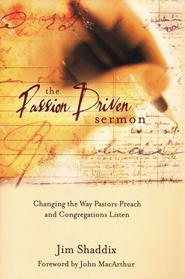
This book review of Jim Shaddix‘s The Passion Driven Sermon was written as part of Pastor Lane’s doctoral course work, and as such, it is written in a more formal, academic tone than the rest of this blog’s posts. Still, we hope the audience will find these academic book reviews useful, which is why we have published them for your reference.
Jim Shaddix is currently the Senior Pastor of Riverside Baptist Church in Denver, Colorado. Prior to serving in his current Senior Pastor role, he served as the Dean of the Chapel and Associate Professor of Preaching at New Orleans Baptist Theological Seminary. He earned a B.S. in Education from Jacksonville State University in Jacksonville, Alabama, a Master of Divinity and Doctor of Ministry from Southwestern Baptist Theological Seminary in Ft. Worth, Texas, and a Doctor of Philosophy in preaching from New Orleans Baptist Theological Seminary. He is the co-author of Power in the Pulpit: How to Prepare and Deliver Expository Sermons (Moody Press, 1999). He will soon be joining the teaching staff of Southeastern Baptist Theological Seminary. Dr. Shaddix is a conservative, evangelical pastor and theologian. He has been teaching, training, and influencing pastors for two decades through his teaching and pastoral ministry. His resume of teaching locations and church service demonstrate his leadership at the highest level in this field.

In this book, the author shares his journey in preaching to inspire more preachers and listeners to be driven by a passion for God to be glorified. This is not a dissection of the “how-to” of expositional sermons and preaching but rather a celebration of its purpose and power. The focus of the content offers a practical theology of biblical preaching that the passion of the preacher, as well as the congregation, should drive the pursuit of faithfulness in this. This book is written specifically to pastors, but also to anyone who is interested in growth of understanding the value and personal benefit of expositional preaching.
The Passion Driven Sermon makes a unique contribution in a broad field of writing. This uniqueness is best summarized through a contrast the author poses by using an analogy between “good stuff” and “God’s stuff.” “Good stuff” is preaching that “cannot be necessarily categorized as heresy or even blatant error, (but) neither can it be described as consisting of the inspired Word of God”[i]. In contrast, “God’s stuff” is the very essence of the Bible [ii], but whose content is more specific and far-reaching. This contrast captures the heart of this book as the author presses the preacher and the listener to never settle for less than and passionately pursue greater measures of God’s glory in every sermon.
The basic outline is a typical form of three chapters each of the major themes of the book: foundational biblical issues, philosophical issues related to the preacher, and practical issues in the preaching event. But an intriguing aspect of this book is that the author structures its reading in such a way to accommodate two paths for the reader. One takes you through a linear progression that fully covers each major theme before moving to the next. An alternative reading plan is offered for the reader to follow a more pragmatic track that moves the subject matter of the book (Content, Resource, and Goal) through each of the theme headings in order to develop them from foundation to consideration to application. This facilitates an interesting and helpful approach to studying the foundational themes the author is pressing the reader into, while also allowing the reader to be able to fully consider the subject matter completely through each theme.
The Passion Driven Sermon is a book that offers a great amount of “how-to” without being highly technical. This book is not written to be a textbook manual for preparing, writing, or preaching sermons. Rather, the deeper motive and purpose for preaching is explored with insight and application that is pregnant with correction and instruction for the preacher and listener. Without a doubt, this book is written to motivate and compel preachers and listeners alike to never settle for sermons that are less than God’s Word. This is not a defense of expository preaching. It is a celebration of the proclamation of God’s Word that glories in God alone, and in turn reveals a shallowness in all other types of preaching. As a result, it covers every major area in the preaching event without laboring through more specific details pertaining to technical matters.
The strength of the content of this material, especially with the alternative reading plan, is that the reader is able to move from foundational issues to philosophical issues to practical issues all on a single subject in a progressive line of reading. This allows the reader to not only be challenged by the content, but also to more fully develop personal responses to the content that are very applicable. As well, it ties the practices of the preacher through his philosophical framework to a biblical foundation. This is a thread that can be often lost when themes are explored systematically.
The presentation of the material is in a manner that helped to “connect all the dots” of the book. I found it easy to remember and relate what had been said to what was being stated. In the alternative reading path, I followed the subject matter through each major theme, from foundation to philosophy to practice. The first theme was Content. In the biblical foundation, the author made a distinct point of clarifying the role of the preacher as one who proclaims God’s message, not one who creates his own message. This was a strong beginning and really started the book in a bold manner. Without hesitation, the first chapter set the tone for the entire book by immediately challenging so many fallacies, errors, and inconsistencies in modern day preaching. Every preacher must determine what he will preach. Will it be only Christ and him crucified, as the Apostle Paul determined? In addition to what will be preached, one must consider how this will be used among the church. The author is very careful to make preaching vital to the overall work of the church in equipping the people and in practice, making it central in worship as an act of worship. As God’s voice, it must be used, revered, and responded to in such a way as is worthy of God.
Once what will be preached is determined, every preacher must determine how he will present his material: “Will God’s power be usurped by man’s presentation?” I appreciate how the author crystalized preaching in the objective work, in the pattern of the prophetic tradition that rests on the Word of God and the work of the Holy Spirit. The authority and power of preaching rests in the Word and Spirit of God. One simple, but I believe profound, practice he mentioned was the value of always leading people directly back to the Bible. In so doing, we teach through practice where the message really comes from and where it can always be found.
The goal of preaching is the final subject of consideration. What do we want to give our sheep each week in preaching? Must we identify specific application for personal life issues? Or, can we preach a gospel that both saves sinners and sanctifies saints? Surely there is nothing impractical about our crucified Savior. The author presents an excellent chapter on how a sermon that accomplishes the goal of preaching by utilizing three types of application: specific, stored, and subliminal. This is helpful to understand how we can accomplish the greatest goal of preaching while also reaching the most specific needs of individuals.
Maybe the single greatest strength of this book is that the author takes what many accept as good and calls the reader to excel toward only what is glorious from God. We work so hard to help people when the primary calling of a preaching is to exalt Christ. These can be such small differences but make such a great impact in preaching. It is not as though people are not helped when Christ is exalted. But it is easy to see how in trying to help people, we can easily neglect to exalt Christ to his rightful place of glory.
Three most helpful aspects stood out for me. First, the author’s thread of connecting the practice of preaching through the philosophical framework with the biblical foundation was an excellent way to offer the material. I found myself critiquing and analyzing my own preaching and presuppositions in a helpful way as I followed this format. Second, the author’s reminder that results do not determine faithfulness for the preacher was a great encouragement that I regularly need to hear. For we do not fully see and cannot completely measure the work of the Spirit in preaching. Nothing can steal the motivation of a preacher more than too great a polarizing view of one’s mental critique during or immediately following the preaching event or of people’s immediate response to the message. When we trust the Spirit, we are released to labor in preaching with joy and passion for God’s glory. Third, the final chapter on :handing off the baton” in the kingdom relay is so potent a reminder of the work we have been called to. Investing in the next generation to raise up leaders is an essential part of the Gospel’s mandate and a great portion of what I believe God has called me to. This was an excellent reminder of the importance, the urgency, and the intentionality that must be in our work to remain faithful as stewards in the great work of making disciples and raising up leaders.
I appreciated the writing style of the author as I read this entire book because it provided ample illustration without belaboring points. I appreciated his thought flow and development and how he used his material not only to inform, but strategically to inspire as well. This material is most appropriate for an advanced preacher who is developing his “voice,” maturing to understand his skill, and seeking to hone his craft. But it is not above the training of a beginner. I do think I benefited most due to the fact that I chose the alternative reading plan. I have decided that I will re-read the book in the direct manner to study each theme as it fully develops through the subjects. The author accomplished his goal of heightening a passion for God’s glory to be proclaimed without compromise in the preaching event.
[i] Shaddix, p65.
[ii] Shaddix, p66.
More book reviews by Pastor Lane